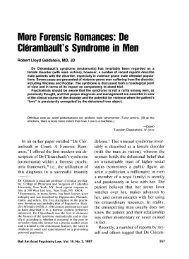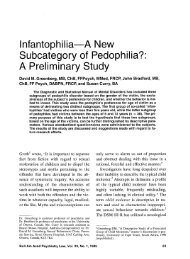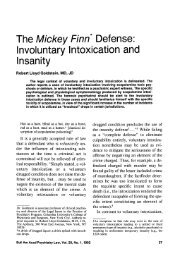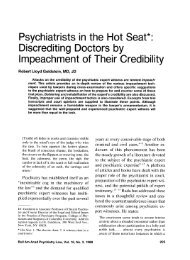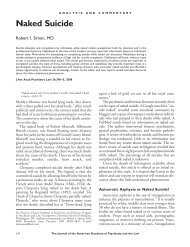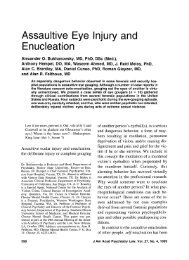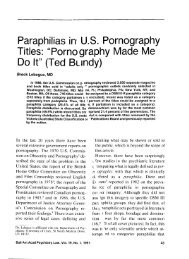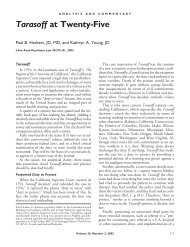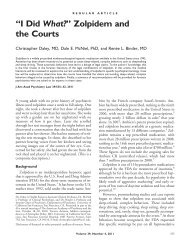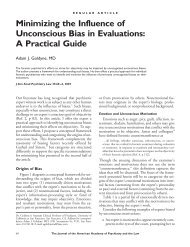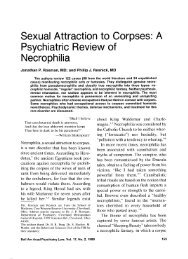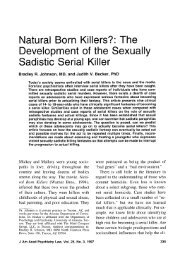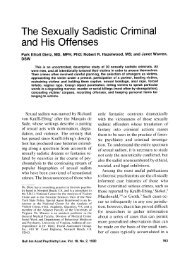Accommodations for Test Anxiety Under ADA?
Accommodations for Test Anxiety Under ADA?
Accommodations for Test Anxiety Under ADA?
Create successful ePaper yourself
Turn your PDF publications into a flip-book with our unique Google optimized e-Paper software.
<strong>Accommodations</strong> <strong>for</strong> <strong>Test</strong> <strong>Anxiety</strong> <strong>Under</strong> <strong>ADA</strong>?<br />
a broad range of jobs in various classes.<br />
Accordingly, he was not regarded as substantially<br />
limited in the major life activity<br />
of working.<br />
Although this latter case may suggest<br />
that test anxiety will encounter a similar<br />
judicial fate, important distinctions can be<br />
drawn between the two. Forrisi's acrophobia<br />
did not preclude the possibility of<br />
his worlng as a utility repairman in jobs<br />
not requiring climbing to heights, and he<br />
was thus not limited in a class of jobs (as<br />
required by both the <strong>ADA</strong> and the Rehabilitation<br />
Act) but only in his specific<br />
one. In contrast, test anxiety can preclude<br />
an individual from a class of professions<br />
and jobs that require examinations <strong>for</strong><br />
application, credentialing, licensure, or<br />
training courses.<br />
Reasonable <strong>Accommodations</strong> and<br />
Modifications Assuming that test anxiety<br />
has surmounted all of the legal hurdles<br />
described above, the <strong>ADA</strong> requires<br />
that the examiner make "reasonable accommodations"<br />
when covered by Title I<br />
(29 C.F.R. 31630.9, 1630.10, 1630.1 l),<br />
or "reasonable modifications" under Titles<br />
I1 and I11 (28 C.F.R. 335.130(b)(7);<br />
28 C.F.R. $36.302) (see also Section 504<br />
of the Rehabilitation Act, 34 C.F.R.<br />
$104.12. 104.13, 104.43, 104.44). In particular.<br />
an examiner, be it an employer,<br />
college, or testing service, may not use a<br />
test the results of which tend to screen out<br />
an individual with a disability or to not<br />
accurately reflect a disabled person's<br />
skills, aptitude, or knowledge. There<strong>for</strong>e,<br />
examiners must provide accommodations<br />
or modifications <strong>for</strong> students with test<br />
anxiety because this disability prevents<br />
them from accurately demonstrating their<br />
abilities and knowledge on a test.<br />
Any examiner who wishes to deny a<br />
requested accommodation or modification<br />
<strong>for</strong> test anxiety must show that the<br />
request is not reasonable. <strong>Under</strong> Title I,<br />
an accommodation is not reasonable<br />
if it imposes an "undue hardship"<br />
on the business (29 C.F.R. 31630.9,<br />
1630.15(d)), and under Title I11 if it imposes<br />
an "undue burden" (28 C.F.R.<br />
336.303, 36.309(~)(3)) on the private entity."<br />
At present we have no good estimates<br />
of the number of persons with test<br />
anxiety. The incidence of social phobia is<br />
estimated to be about five to seven percent<br />
of the population, and not all of these<br />
experience test anxiety. Among those<br />
who do, some have been successfully<br />
treated. In any event, it is safe to say that<br />
the number needing to be accommodated,<br />
under the criteria described below, will be<br />
far fewer than the number of examinees<br />
with learning disabilities who are now<br />
being accommodated. Hence it is unlikely<br />
that accommodations <strong>for</strong> test anxiety will<br />
impose an undue hardship or burden on<br />
examiners.<br />
A second argument against the reasonableness<br />
of a request <strong>for</strong> untimed (or extended<br />
time) exams is that they undermine<br />
the purpose of the examination. If<br />
one of the goals of an exam is to see how<br />
well the examinee answers under time<br />
pressure. then an unpressured exam defeats<br />
that goal. Neither Section 504 nor<br />
Iln the Wynne v TI&^ Univ Sch of Med case discussed<br />
below, the court concludes that under Section 504, feasibility<br />
and cost may be taken into consideration by an<br />
academic institution in deciding whether a modification<br />
to an exam would result in a lowering of academic<br />
standards or requiring substantial program alteration.<br />
J Am Acad Psychiatry Law, Vol. 25, No. 2, 1997 203




